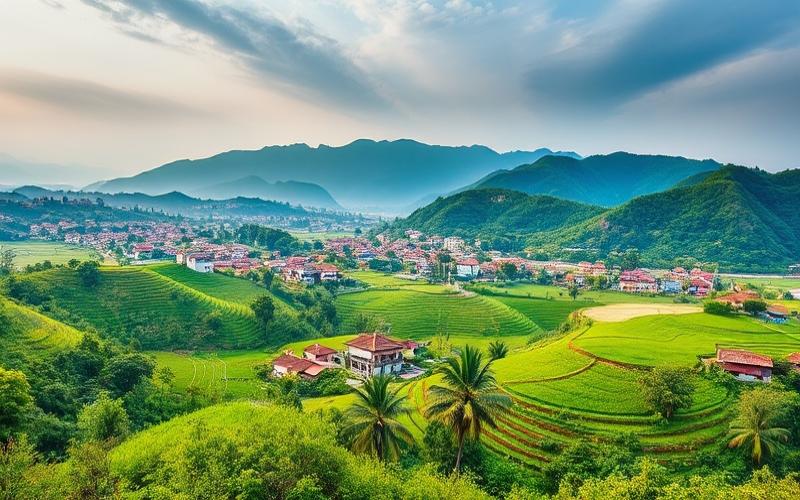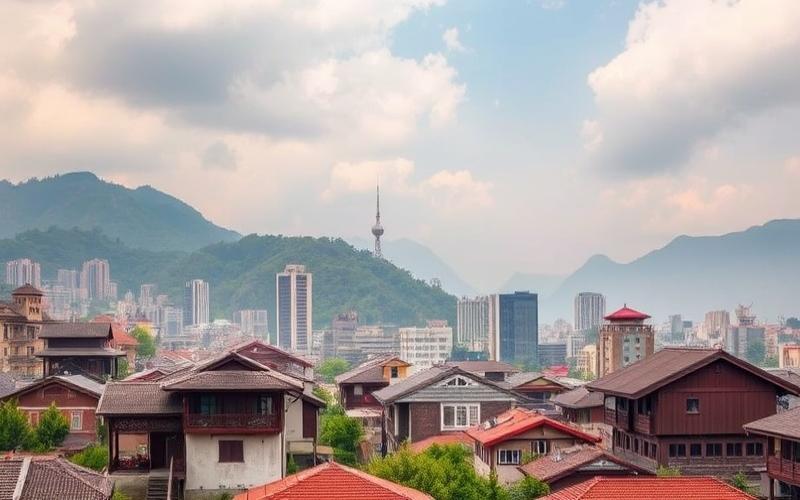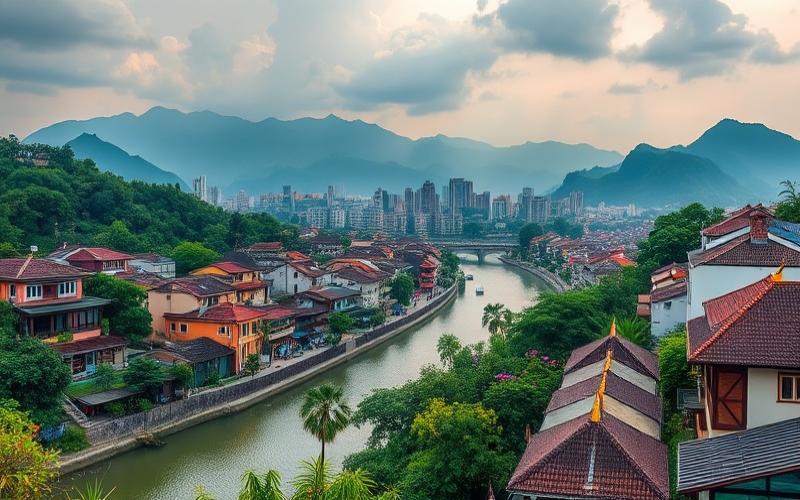
 Published on and written by Cyril Jarnias
Published on and written by Cyril Jarnias
Buying Agricultural Land in Hungary: What You Need to Know
Purchasing agricultural land can be an excellent investment opportunity, but it requires a thorough understanding of local specifics. In Hungary, this process involves unique legal characteristics that deserve attention.
With an attractive and fertile rural landscape, the country is attracting more and more foreign investors. However, it’s crucial to know the specific regulations governing this process in Hungary, particularly regarding acquisition restrictions for non-residents.
Good to Know:
This introduction will guide you through the essential legal aspects, equipping you with the necessary information to successfully navigate the world of Hungarian agricultural land acquisition.
Overview of Agricultural Land Acquisition Laws in Hungary
Main Regulations Governing Agricultural Land Acquisition in Hungary:
- Only Hungarian citizens and European Union nationals residing in Hungary, with at least three years of agricultural experience or an agricultural university degree, can acquire agricultural land.
- Non-EU foreigners and legal entities cannot purchase agricultural land, but they can lease up to 1200 hectares for a maximum period of 20 years.
- For authorized foreigners (mainly EU citizens), the acquisition limit is generally set at 1 hectare, with the obligation to obtain special permission.
Legal Restrictions and Requirements:
- The total area owned by an individual cannot exceed 300 hectares for those eligible to purchase.
- The buyer must prove their status as a farmer through a diploma or minimum three years of agricultural activity in Hungarian territory.
- Acquisitions are subject to approval by the local land committee and relevant administrative authorities.
- Priority is given to local farmers and young farmers during competing applications.
Necessary Steps to Obtain Authorization:
- Submission of documentation proving farmer status (diploma or experience).
- Filing the application with the local land committee.
- Verification by competent Hungarian authorities.
- Possible obtaining of special authorization if EU foreign buyer.
- Notarized signature after administrative validation.
List of involved government agencies:
- Local Land Committee
- County Administrative Authorities (County Administrative Office)
- Ministry of Rural Development
| Category | Acquisition Possible | Main Restrictions |
| Hungarian Citizen | Yes | Max 300 ha |
| EU Citizen Resident | Yes | Experience/degree required |
| Non-EU Foreigner | No (purchase) | Lease max 1200 ha/20 years |
Recent Reforms / Legislative Changes:
- Law No. CXXII effective May 1, 2014: partial opening to European citizens while maintaining strict restrictions on professional qualifications and purchasable area.
- Government cancellation of priority options in certain previous contracts, leading to several European procedures against Hungary since 2014 concerning these restrictions deemed excessive under community law.
Property Rights and Influential Environmental Regulations:
The Hungarian Constitution explicitly protects land as national heritage against speculation, favoring small producers rather than large financial groups or foreign investors.
Important points regarding environmental rights:
- Transactions must comply with national regulations concerning forest and water preservation.
- Any acquisition potentially impacting these resources undergoes enhanced controls.
Access to the agricultural land market therefore remains heavily regulated in Hungary, prioritizing national heritage protection, strict professional control, and compliance with environmental standards.
Good to Know:
In Hungary, the acquisition of agricultural land by foreigners is strictly regulated and generally requires authorization from the Ministry of Agriculture after consultation with local authorities and the agricultural chamber. EU citizens can purchase land under certain conditions, including proof of residence and agricultural activity in the country. Recent laws have imposed limitations on property sizes to prevent land concentration. Property rights are strongly protected; however, environmental regulations may impose usage restrictions depending on the area concerned. The Land Registry Office handles registrations, and it’s advisable to conduct due diligence to ensure the land is not subject to disputes or environmental restrictions.
Understanding Rural Zoning in Hungary
Rural areas in Hungary cover approximately 87% of the national territory and 95% of municipalities. They are characterized by low population density, strong dependence on agriculture, and a non-urbanized settlement structure with villages, small towns, and isolated farms.
Main Types of Rural Areas and Their Classification:
| Zone Type | Description | Primary Use |
|---|---|---|
| Protection Zones | Protected natural spaces, national parks, ecological reserves, heritage sites | Conservation, limited tourism |
| Agricultural Zones | Areas primarily dedicated to agriculture, crops, livestock | Agricultural operation |
| Mixed Zones | Areas combining agricultural, residential, and sometimes artisanal or tourist activities | Multipurpose use |
| Rural Habitat Zones | Villages, small towns, hamlets | Residential, local services |
Regulations Governing Each Zone Type:
- Protection zones are subject to strict restrictions regarding construction, agricultural or forestry exploitation, and require specific permits for any activity likely to impact the environment.
- Agricultural zones impose rules on crop types, pesticide use, minimum plot sizes for operation, and preservation of arable land.
- Mixed zones are regulated by local urban plans, which specify permitted uses and limits for non-agricultural construction expansion.
Competent Authorities and Their Roles:
- Local communities (település, község, város): issue building permits, manage local services, and develop local urban plans.
- Counties (vármegye): ensure coordination of regional spatial planning and compliance with national policies.
- National authorities (e.g., Ministry of Agriculture, Ministry of Environment): set broad zoning guidelines, agricultural policy, and manage nationally significant protected areas.
Restrictions and Permits for Land Purchase and Use:
- To purchase agricultural land, approval from local authorities and sometimes authorization from the competent ministry is generally required, especially for plots exceeding certain size thresholds.
- Specific restrictions apply to foreigners: they often must justify residence in Hungary and/or actual agricultural activity to acquire agricultural land.
- Land use must comply with local zoning plans (e.g., impossibility of building a residence on strictly agricultural land).
Legal Implications for Foreigners and Residents:
- Hungarian residents: can freely purchase agricultural land subject to compliance with local rules and maximum permitted size.
- Foreigners: subject to a restrictive regime; direct acquisition of agricultural land by non-residents or foreign companies is generally prohibited or heavily regulated, except for exceptions (resident status, bilateral agreement, etc.).
Concrete Examples and Case Studies:
- Case 1: A Hungarian investor wants to convert agricultural land into a residential subdivision. They must request a zoning change from the municipality and obtain approval from regional authorities.
- Case 2: A foreign national settled in Hungary wants to acquire a farm. They must prove their residence, obtain a purchase permit from agricultural authorities, and commit to maintaining agricultural activity on the land.
- Case 3: A company wants to operate land in a protected zone for agritourism. They must comply with strict environmental standards and obtain special authorization from the competent ministry.
Good to Know:
In Hungary, rural zoning is divided into several classifications, including protection zones, agricultural zones, and mixed zones, each governed by specific regulations that dictate permitted activities. Local authorities, such as municipal offices and the Ministry of Agriculture, play a key role in managing these zones, ensuring compliance with laws and facilitating the obtaining of necessary permits for land purchase and use. Purchasing land in protected areas often requires special permits and may include usage restrictions. For foreigners, notable legal implications exist, such as the obligation to obtain government approval before acquiring agricultural land. For example, a foreign investor wanting to convert agricultural land into a mixed zone for commercial projects might face strict conditions or encounter local restrictions. Residents, on the other hand, generally benefit from simplified procedures but must comply with zoning regulations that may limit permitted crop types or infrastructure.
Important Note
Any purchase or change of use operation for rural land in Hungary must be preceded by careful verification of zoning and local regulations, under penalty of transaction nullity or administrative sanctions.
Building Permit Considerations in the Hungarian Countryside
Obtaining a Building Permit in Rural Areas in Hungary: Requirements, Process, and Specifics
Legislation and General Framework
- Construction rules in Hungary are primarily governed by the law on the formation and protection of the built environment (1997), supplemented by local regulations that incorporate environmental and landscape considerations.
- Law LIII/1995 also imposes strict standards regarding environmental preservation during land development or change of use.
Differences Between Agricultural and Residential Land
| Criterion | Agricultural Land | Residential Land |
|---|---|---|
| Permitted Use | Agricultural activities, related buildings | Dwellings, residential annexes |
| Conversion | Requires specific procedure | Not required if already classified residential |
| Restrictions | Very limited construction | Subject to local urban plan |
| Legal Priority | Preservation of cultivable land | Controlled urban development |
To build a residence on agricultural land, a declassification (“change of use”) process is often required, subject to additional authorization.
General Process for Obtaining a Permit
- Verification of local zoning (urban plan)
- Confirm project compatibility with land status.
- Preparation of technical file:
- Detailed project plan
- Proof of ownership or lease
- Environmental study if required
- Submission to competent municipal authorities:
- The rural town hall processes applications according to local rules derived from national laws.
- Administrative review:
- Formal control (documents)
- Urban/environmental assessment
- Possible publication for public consultation
Generally Required Documents
- Land title or notarized deed attesting ownership/building right
- Architectural plans certified by a licensed Hungarian professional
- Technical report on environmental impact (if applicable)
- Certificate of compliance with local urban plan
Average Timeframes for Permit Obtainment
Standard timeframe: approximately 30 to 60 business days after complete submission*
This timeframe may extend in case of:
- Need for in-depth environmental study,
- Change from agricultural to residential use,
- Administrative or public objections.
Local Specifics That May Influence Authorization:
Frequent restrictions in rural areas:
- Strict protection against uncontrolled urban sprawl to preserve arable land.
- Specific regulations on:
- Maximum building height,
- Exterior materials compatible with rural landscape,
- Respect for protected panoramic views in certain sensitive sectors,
- Prohibition/increased difficulty for converting purely agricultural land without valid reason related to local rural activity.
Specific environmental regulations:
- Possible obligation to conduct a preliminary study if near protected natural area or natural monument/historical heritage.
Note
For any non-European foreign buyer wishing to acquire and then develop rural real estate, prior administrative licensing is mandatory before any urbanistic procedure; this process generally takes an additional 15 to 30 business days.
⚠️ Procedures can vary significantly depending on the county/rural municipality concerned; it is therefore recommended that potential buyers—especially foreigners—systematically consult local authorities before any final commitment.
Checklist – Key Points to Verify Before Submission
- Exact land classification according to local plan;
- Possible existence of easements/restrictions related to neighborhood;
- Specific landscape/environmental obligations;
- Anticipate additional delays if purchase by non-EU foreigner.
Good to Know:
In Hungary, obtaining a building permit in rural areas requires navigating through a series of local and national regulations. Agricultural lands generally have more restrictions compared to residential lands and often require a reevaluation of their use in accordance with the local urban plan. Among the required documents are a property certificate, detailed construction plans, and proof of compliance with environmental guidelines. The permit obtainment duration can range from a few months to a year, depending on project complexity and necessary inspections. It’s crucial to respect rules on natural ecosystem preservation and panoramic views, particularly in protected areas such as those near national parks. The latest updates adopted in 2023 strengthen the protection of rural landscapes, sometimes imposing special considerations like maximum building heights or specific construction materials, essential for any permit application.
Disclaimer: The information provided on this website is for informational purposes only and does not constitute financial, legal, or professional advice. We encourage you to consult qualified experts before making any investment, real estate, or expatriation decisions. Although we strive to maintain up-to-date and accurate information, we do not guarantee the completeness, accuracy, or timeliness of the proposed content. As investment and expatriation involve risks, we disclaim any liability for potential losses or damages arising from the use of this site. Your use of this site confirms your acceptance of these terms and your understanding of the associated risks.


















































